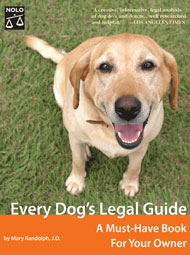Providing for Pets
The Providing for Pets section includes
|
Why You Can't Leave Money to a Dog- And What Happens If You Try Strategies for Taking Care of Pets Arranging for Veterinary Care Will Provisions That Order Animals Destroyed |
Most pet owners, who go to such lengths to care for their animals, want to make sure that when they die, their pets will still be well taken care of. For people who are elderly or seriously ill, this can be an immediate concern.
Some people make informal arrangements; there is an "understanding" that a friend, neighbor, or relative will care for a dog if the owner can't. Often that's enough, but not always. What if, for example, the person you've asked to provide care doesn't have much money to spare, and might be burdened by food and veterinary bills? Or isn't able to care for the dog when needed?
Usually, it is better to make more formal provisions for your dog's care. Before we get into specifics about what you can do, here are a few legal and practical rules to keep in mind:
- Don't leave money or other property to your dog through a will.
- Instead, plan to leave your dog, and perhaps some money for expenses, to someone you trust to look out for it.
- Don't rely on the legal system to enforce your wishes concerning care of your pet after you die. Make your own arrangements with someone you trust. The legal system, cumbersome and unreliable enough when it comes to providing for human survivors, is untrustworthy when you're concerned about the animals you will leave behind.
EMERGENCY CARE FOR YOUR DOG WHEN YOU'RE UNAVAILABLE
While you're making arrangements for your dog's care after your death, also think about what would happen to your dog in an emergency, if you became sick or disabled and couldn't care for it for an extended period. Obviously, it makes sense to have a fallback caretaker. Arrange with someone to take care of the dog, and write down any needed instructions. Think about what food the dog eats, what medication it needs, who your veterinarian is, who takes care of grooming - and make sure the designated temporary caretaker has, or can easily get to, a copy of your instructions.1
It's a good idea to carry a card in your wallet stating that you have animals that need to be cared for, and the name, address, and phone number of the person who has agreed to take over.
